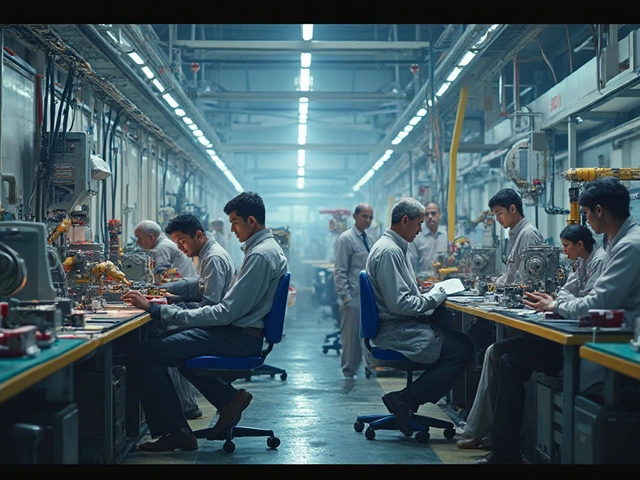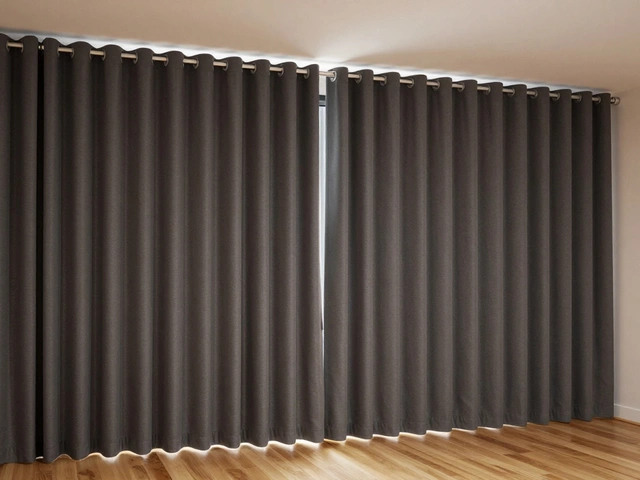
Ever wondered why small scale manufacturing is such a hot topic right now? It's not just because folks are looking for unique, personalized goods. These small ventures often lead to big innovation without needing a gigantic budget. Plus, it's a fantastic way to meet niche market demands with agility.
Let's talk about some industries currently making waves. Take homemade cosmetics, for instance. With everyone obsessed with natural and organic these days, homemade beauty products are booming. Then there's the world of 3D printing, where everything from custom jewelry to quirky home decor can be crafted right at home or in a small workshop.
If you're thinking about jumping in, start by identifying a gap in the market that you can fill. Research is key—know your audience, understand your costs, and think about how you can stand out. It doesn't hurt to start small, maybe selling online, and see where the wind takes you.
- Why Small Scale Manufacturing?
- Current In-Demand Industries
- Tips for Starting a Small Manufacturing Business
- Future Trends to Watch
Why Small Scale Manufacturing?
Small scale manufacturing is creating quite a buzz these days, and for good reason. One of the biggest advantages is the ability to quickly adapt to changing consumer preferences—a luxury large-scale manufacturing often can't afford. With the marketplace evolving at breakneck speed, flexibility is a major asset.
Flexibility and Innovation
Small manufacturers excel in being nimble and innovative. Imagine being able to tweak your product line based on the latest trends, or customize an offering based on specific customer feedback. This kind of demand industries flexibility allows for innovation that's hard to achieve for bigger players.
Local Economic Boost
Another compelling reason to dive into small scale manufacturing is the positive impact on local economies. By sourcing materials locally and hiring nearby talent, these businesses help promote community growth and sustainability. It's a win-win situation for everyone involved.
Low Entry Barrier
Starting a small scale manufacturing venture requires less capital compared to setting up a large factory. With the right idea and execution, you can get started relatively quickly. Often, you'd only need a small workshop or even a garage to begin crafting your products.
| Category | Starting Cost |
|---|---|
| Homemade Cosmetics | $500 - $5,000 |
| 3D Printed Crafts | $1,000 - $10,000 |
The table above gives a rough estimate of initial costs in a couple of popular sectors. These figures showcase the relatively accessible nature of the market.
Meeting Niche Market Needs
Finally, popular manufacturing on a small scale allows you to cater directly to niche markets with specific needs. Whether it's eco-friendly products, customized items, or handcrafted goods, you can tap into these ready-made audiences that larger companies often overlook.
All in all, small scale manufacturing isn't just about producing goods; it's about creating opportunities for innovation, economic growth, and meeting trends head-on.
Current In-Demand Industries
In today’s fast-moving world, certain small scale manufacturing sectors are grabbing the spotlight. Let's dive into what’s really resonating with people right now.
Homemade and Organic Cosmetics
The beauty industry is booming, with a big shift toward natural and organic products. Small businesses crafting homemade soaps, lotions, and other skincare items are thriving like never before. Why? Today's consumers are increasingly conscious about what they’re applying to their skin, and they're seeking out products with ingredients they can actually pronounce.
3D Printing: A Maker’s Dream
3D printing is changing the game for manufacturing enthusiasts and hobbyists alike. It’s not just about gadgets; you can create anything from fashion accessories to functional home items. The barrier to entry is relatively low—meaning it's accessible to those who want to innovate without massive startup costs. What’s cool is the customization aspect. People love personalized goods, and 3D printing offers just that.
Sustainable Fashion
Everyone knows fast fashion has a massive carbon footprint. That’s why sustainable fashion creators who focus on eco-friendly materials and ethical production processes are gaining traction. It's a win-win: customers get unique, style-forward pieces, and manufacturers contribute to a healthier planet.
Zero-Waste Products
Cutting down on waste is a huge trend. Folks are on the lookout for reusable, biodegradable alternatives to plastic—think reusable straws, produce bags, or beeswax wraps. These products are not only saving the planet but are also proving to be lucrative for small manufacturers.
| Industry | Growth Rate | Key Markets |
|---|---|---|
| Organic Cosmetics | 8% annually | North America, Europe |
| 3D Printing | Expected $22bn by 2030 | Global |
The key to success in any of these manufacturing trends is to understand your target audience and deliver what they didn't know they needed. Consumer demand is evolving, and these industries are perfectly positioned to meet those emerging needs.

Tips for Starting a Small Manufacturing Business
Jumping into the world of small scale manufacturing? It's an exciting adventure, but it does require some strategizing. Here are some handy tips to get you up and running.
Identify Your Niche
First things first, you need to find your niche. What's the one thing you can make that people really need or want? Maybe there's a demand rise for eco-friendly packaging or homemade soaps. The key is to spot that gap in the market where you can make a mark.
Plan and Research
Once you've got an idea, it's time to dive into planning. Check out your potential competitors and understand their offerings. What can you do differently or better? Have a clear and realistic business plan that estimates costs, pricing, and profitability. It might sound a bit dry, but it's crucial for keeping your business on track.
Set Up Efficient Operations
Let's talk equipment. For small scale manufacturing, you don't need a huge factory. Start with the basics and scale up as needed. Source affordable, reliable machinery, and ensure your workshop is both safe and efficient. Organize your space well; a clutter-free area helps boost productivity.
Quality Control
Quality is king. Regardless of what you're making, ensuring consistency and high standards will keep customers coming back. Regularly test your products and seek feedback to continuously improve and stand out in the manufacturing trends.
Market Your Product
Even the greatest product won't sell itself. Get savvy with marketing. Start small with social media and online marketplaces where people interested in popular manufacturing trends hang out. Share your story, engage with your audience, and offer deals to early customers.
Stay Adaptable
The manufacturing world changes quickly—staying flexible is key. Keep an eye on new technologies and adjust your strategies as trends and demands shift. This adaptability can give you an edge over larger, more sluggish players.
With these tips in your toolkit, you're ready to embark on your small manufacturing journey. Just remember to stay curious, keep learning, and enjoy the process!
Future Trends to Watch
As we move forward, there are some exciting trends in small scale manufacturing that you’ll want to keep on your radar if you're planning to jump into this space. The beauty of these trends is their potential to drive forward-thinking businesses without requiring a massive setup.
1. Rise of Sustainable Products
Consumers are becoming increasingly eco-conscious, and they’re willing to spend more on items that are kinder to the planet. This involves using recycled materials, creating longer-lasting products, or employing methods that reduce waste. For the savvy entrepreneur, this trend offers a golden opportunity to stand out in the manufacturing landscape.
2. Technological Integration
You might want to embrace digital advancements like Internet of Things (IoT) and Artificial Intelligence (AI) in your processes. These technologies not only improve efficiency but also provide data-driven insights that can help refine your manufacturing process. Imagine having a streamlined operation without needing a huge industrial setup!
3. Localized Manufacturing
There’s a growing move towards producing goods closer to where they're consumed. It's all about reducing transportation costs and environmental impact. Additionally, having a local touch can appeal to customers looking for unique, regionally crafted items.
4. Personalization Craze
Offering products that can be tailored to individual tastes is a game changer. Whether it's made-to-order furniture or custom-fit clothes, personalization is here to stay. This trend allows you to create a niche that keeps customers coming back because they can’t get what you offer anywhere else.
5. Digital Marketplaces
The rise of online platforms has made it easier than ever to reach a global audience. Connecting with customers via these platforms can significantly amplify your sales, giving your small scale manufacturing venture a much wider reach than a traditional storefront ever could.
| Trend | Benefits |
|---|---|
| Sustainable Products | Eco-friendly appeal, reduced waste |
| Technological Integration | Efficiency, data insights |
| Localized Manufacturing | Lower costs, local appeal |
| Personalization Craze | Unique offerings, repeat customers |
| Digital Marketplaces | Global reach, increased sales |
Keeping an eye on these trends and being ready to adapt can set you up for success in the exciting world of small scale manufacturing.




